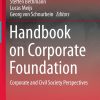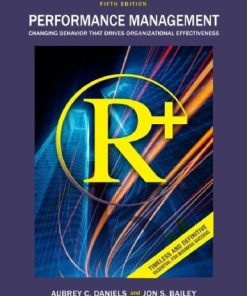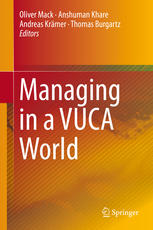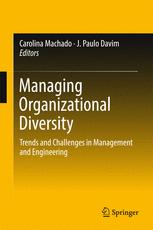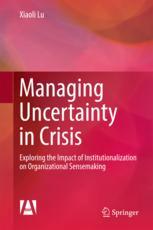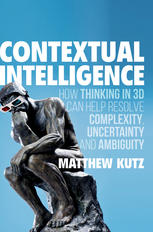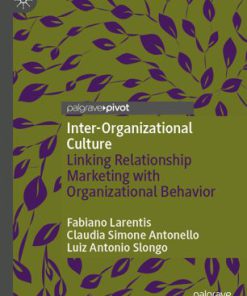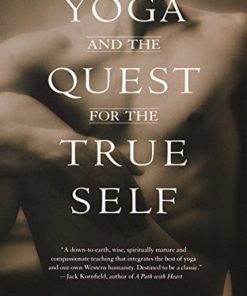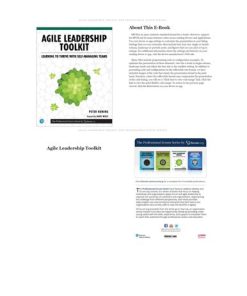Managing VUCA Through Integrative Self Management 1st Edition by Sharda Nandram, Puneet Bindlish ISBN 3319522310 9783319522319
$50.00 Original price was: $50.00.$25.00Current price is: $25.00.
Managing VUCA Through Integrative Self Management 1st Edition by Sharda S. Nandram, Puneet K. Bindlish – Ebook PDF Instant Download/Delivery: 3319522310, 978-
Full dowload Managing VUCA Through Integrative Self Management 1st Edition after payment
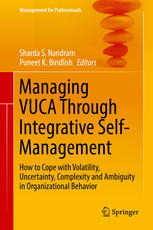
Product details:
ISBN 10: 3319522310
ISBN 13: 978-3319522319
Author: Sharda S. Nandram, Puneet K. Bindlish
In this book, experts discuss whether volatility, uncertainty, complexity and ambiguity (VUCA) represent a challenge or a business opportunity. More intense debates on global climate change, increased turbulence in financial quarters, increased job insecurity and high levels of stress at the workplace are attracting attention in the context of organization behavior and entrepreneurship. Fear and confusion have become part and parcel of business, often undermining trust, cooperation and inspiration. As a response, a new way of organizing self-management has emerged. The book combines practical wisdom from East and West, to develop integrative self-management theory and practice; provides direction to support an integrative mind-set, integrative organization and integrative leadership; and presents VUCA as an opportunity and necessity for development and growth, rather than a threat.
Managing VUCA Through Integrative Self Management 1st Table of contents:
Part I: Swadharma: Self-Righteousness: Towards Intrinsic Guidance by Our Inner Life
-
Introduction to VUCA
-
1. Understanding VUCA
-
2. Integrative Self-Management as a Way Forward
-
3. Structure of the Book
-
3.1 Part 1: Swadharma
-
3.2 Part 2: Swavalamban
-
3.3 Part 3: Swaraaj
-
3.4 Part 4: Integrative-ness
-
-
References
Spiritual Discernment as a Method of Judgment
-
1. The Nature and Practice of Spiritual Discernment
-
2. Hannah Arendt’s Discovery of Judgment as a Separate Faculty of the Mind
-
3. Difference Between Reasoning and Judging
-
4. The Role of Taste, Imagination, and Feelings
-
5. How to Validate Our Feelings of Taste?
-
6. From Arendt’s Theory of Judgment to a Spiritual-Based Practice of Leadership
-
7. Leader as Facilitator of Good Judgment: Story of Oticon
-
8. Conclusion
-
References
Perspectives of Saint John Chrysostom for the VUCA World
-
1. Introduction
-
2. Why Chrysostom’s Work Is Pertinent for a Mindfulness-VUCA Analysis?
-
3. The Integrative Mindfulness Program
-
3.1 An Anthropological Anchorage
-
3.2 A First Step: Get Lucidity: New Vision
-
3.3 A Second Step: Get Discernment by Identifying Virtues and Passions in Management
-
3.3.1 Example of Natural Passion: Anger
-
3.3.2 Example of a Non-Natural Passion: Greed
-
-
3.4 A Third Step: Get Wisdom by Practice and Exercises: The Nepsis Manager
-
-
4. Conclusions
-
References
Making Sense of Organizational Change in Times of Dynamic Complexity
-
1. Introduction
-
2. The Dominant Logic of Change Managerialism
-
3. Case Illustration: ServiceCo
-
3.1 Research Design
-
3.2 Empirical Context
-
-
4. Enacting Change Managerialism
-
4.1 Instrumental Rationality
-
4.1.1 Categorization, Uniformity, and Standardization
-
4.1.2 Assumption of Fixed Reality/Stability
-
4.1.3 Assumption of Homogeneity
-
4.1.4 McDonaldization
-
-
4.2 Grandiose Change Discourse
-
4.2.1 ‘Professional’ Discourse
-
4.2.2 Discursive Amplification of Change
-
4.2.3 Repackaging of Emptiness
-
4.2.4 Reduction of Complexity to Simplicity
-
4.2.5 Crisis and Market Pressure Rhetoric
-
-
-
5. Impact of Change Managerialism on Sense-Making Micro-Processes
-
5.1 Colonization of Lifeworld
-
5.2 De-familiarization
-
5.3 Discursive Disconnection
-
5.4 Suppression of Reflexive Capabilities
-
-
6. Conclusion: The Role of Reflexivity in a VUCA Context
-
References
Living and Leading in a VUCA World: Response-Ability and People of Faith
-
1. Introduction
-
2. Globalization and the VUCA World
-
3. Religion: A Source of Grievances or the Power to Heal?
-
4. Living and Leading in the VUCA World: Unity in Diversity
-
5. Paradox and Contradictions: The Seedbed for Engaging in the VUCA World?
-
6. Management Education as a Catalyst for Transformation
-
7. Conclusion
-
References
Maintaining ‘Respect for Spirituality’ in a Secular Work Environment
-
1. Introduction
-
1.1 Issues of Intersectionality
-
1.2 ‘Mind the Gap’: Spirituality Teachings, Implications, and Ensuing Questions
-
1.3 Spirituality as a Human Perspective and Reasons for Gaps in the Literature
-
1.4 Overview of Chapter and Introduction Summary
-
-
2. Literature Review
-
2.1 Intersectionality and Self-Righteousness
-
2.2 Spirituality: A Historical Perspective and Further Debates
-
2.3 Spirituality Definitions
-
2.4 Common Discussion Themes in Spirituality
-
-
3. Methodology
-
3.1 A Narrative Research Approach
-
3.2 Research Design and Procedure
-
3.3 Case Context: The Research Subject
-
3.4 Data Collection: Research Methods, Instruments
-
3.4.1 Story-Telling
-
3.4.2 Observation
-
-
-
4. Data Analysis
-
5. Findings
-
5.1 Career Sector: Roles and Responsibilities
-
5.2 Feelings
-
5.3 Workplace Challenges
-
5.4 Personal Values
-
5.5 The Challenges Continue
-
5.6 Emotions
-
5.7 How Workplace Challenges Were Addressed
-
5.8 Advantages and Disadvantages of Spirituality at Work
-
5.9 Analyses of Findings
-
-
6. Concluding Discussions
-
6.1 Exploring Intersectionality and Self-Righteousness: A Coping Mechanism
-
6.2 Growing Interest Yet Limited Written Works Exist for Teaching Spirituality
-
6.3 Recognizing the Importance of Spiritual Beliefs to Employee Well-Being
-
6.4 Praying to Cope with Adversity
-
-
7. Recommendations: Theoretical and Practical Implications
-
References
Part II: Swavalamban: Self-Reliance: From Sustainability to Self-Reliance
-
Leadership in the Midst of Transition: Reflections on Self-Reliance, Responsibility, and Spirituality
-
1. Introduction
-
2. Transition Narratives
-
3. Reflections
-
3.1 Self-Reliance
-
3.2 Responsibility
-
3.3 Spirituality
-
-
4. Conclusion
-
-
References
Spirituality, Family, Socialization, and People (Soft) Skills Development for a VUCA World
-
1. Introduction: Why Talk About People Skills?
-
2. Method
-
3. Where Do People Skills Come From?
-
4. From Spiritual Beliefs, Through Family Life to People Skills and Achievements in the VUCA World
-
5. Conclusion: Family, People Skills, and Achievements in VUCA
-
References
Thinking Inside the Box: Applying the Theory of Karma to Make Boundary Judgments in Systemic Intervention
-
1. Introduction
-
2. Action Research (AR)
-
3. Participatory Action Research (PAR)
-
4. Systemic Intervention
-
5. Dealing with Boundary Critique
-
6. The Theory of Karma
-
7. Examples of Systems Interventions
-
7.1 Gandhi and the Indian Independence Movement
-
7.2 Slavery and Bonded Labour Program
-
7.3 ‘Karmayogi’ Sreedharan: Transforming Indian Transportation
-
-
8. Conclusions
-
References
Rediscovering Transcendence Behind VUCA and Technology
-
1. Introduction
-
2. The Historical Context in Brief
-
3. Jaspers
-
3.1 Volatility
-
3.2 Ambiguity
-
3.3 Complexity
-
3.4 Uncertainty
-
-
4. Sloterdijk
-
4.1 Ambiguity
-
4.2 Volatility
-
4.3 Uncertainty
-
4.4 Complexity
-
-
5. Heidegger
-
5.1 Volatility
-
5.2 Uncertainty
-
5.3 Complexity
-
5.4 Ambiguity
-
-
6. Conclusion
-
References
Part III: Swaraaj: Self-Freedom: Towards Meaningful Fulfillment of Life Purposes
-
Karmic Leadership for a Mindful Existence
-
1. Pure Existence in a Complex World
-
2. 4Ps of Karmic Leadership: Towards a Conscious Reality of the World
-
2.1 Purpose: Embrace the Ambiguity and Change
-
2.2 Passion: ‘From Obsession for Results to Obsession for Excellence’
-
2.3 Patience: ‘Remain Calm at the Eye of the Storm’
-
2.4 People: Become a Responsible Leader
-
-
3. Conclusion
-
People also search for Managing VUCA Through Integrative Self Management 1st:
managing vuca through integrative self-management
what are the self management strategies
self management methods
managing in vuca world
You may also like…
Business & Economics
Business & Economics
Business & Economics - Human Resources
Business & Economics - Human Resources
Politics & Philosophy
Business & Economics
Politics & Philosophy
Computers - Programming


